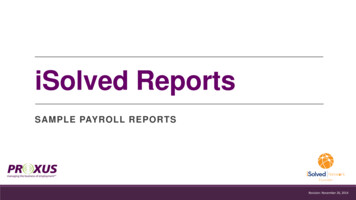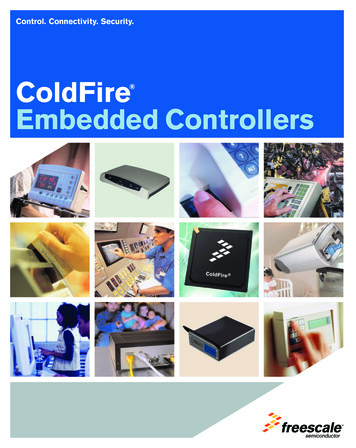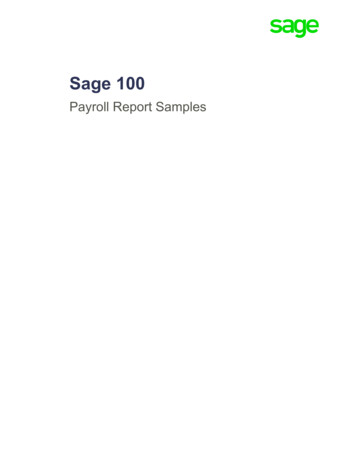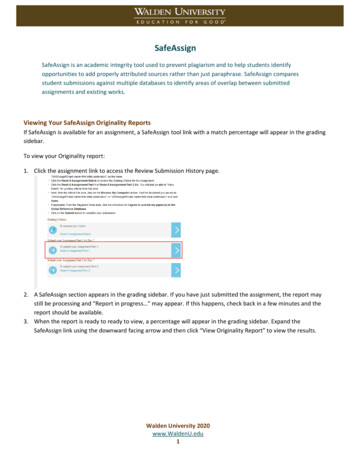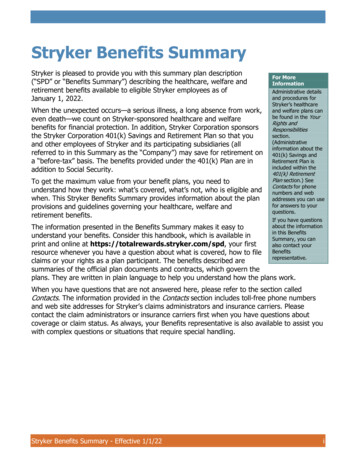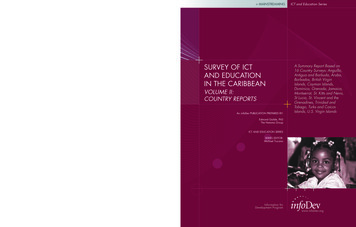
Transcription
mainstreamingSURVEY OF ICT AND EDUCATION IN THE CARIBBEANThis project seeks to gather together in a single resource the most relevant and useful informationon ICT in education activities in the Caribbean.The study addresses the following general topics: The state of policy and planning Current usage of ICT in the primary, secondary and tertiary education systems Pre-service and in-service teacher professional development (TPD) Critical challengesContents: Regional trends in ICT in Caribbean education Global trends in ICT and education, and their relevance to the Caribbean context Selected regional ICT initiatives in education Regional and national EMIS initiativesThis Summary Report is complemented by 16 separate Country Reports addressing policy andplanning; ICT in primary and secondary schools; TPD; tertiary education; non-formal learningand TVET; education management information systems (EMIS) and Ministry of Education (MOE)capacity; barriers and challenges.Please note that Cuba, the Dominican Republic, Haiti, and the U.S. Commonwealth Territory ofPuerto Rico are not included in this survey.About infoDevinfoDev is a partnership of international development agencies, coordinated and served by anexpert Secretariat housed in the Global ICT Department (GICT) of the World Bank, one of its keydonors and founders. It acts as a neutral convener of dialogue, and as a coordinator of jointaction among bilateral and multilateral donors—supporting global sharing of information on ICTfor development (ICT4D), and helping to reduce duplication of efforts and investments. To thisend, infoDev sponsors cutting-edge research and analysis to help identify global best practice inthe use of ICT4D.www.infoDev.orgSurvey of ICT and Education in the Caribbean – Volume iI: country reportsA Summary Report, Based on 16 Country SurveysSurvey of ICTand Educationin the CaribbeanVolume II:Country reportsAn infoDev PUBLICATION PREPARED BY:ICT and Education SeriesA Summary Report Based on16 Country Surveys: Anguilla,Antigua and Barbuda, Aruba,Barbados, British VirginIslands, Cayman Islands,Dominica, Grenada, Jamaica,Montserrat, St. Kitts and Nevis,St Lucia, St. Vincent and theGrenadines, Trinidad andTobago, Turks and CaicosIslands, U.S. Virgin IslandsEdmond Gaible, PhDThe Natoma GroupICT AND EDUCATION SERIESSERIES EDITOR:Michael TrucanoInformation forDevelopment Programwww.infoDev.org
Survey of ICTand Educationin the CaribbeanVolume II:Country ReportsAn infoDev PUBLICATION PREPARED BY:Edmond Gaible, PhDThe Natoma GroupICT AND EDUCATION SERIESSERIES EDITOR:Michael TrucanoInformation forDevelopment Programwww.infoDev.org
2009 The International Bank for Reconstruction and Development/The World Bank1818 H Street NWWashington DC 20433Telephone: 202-473-1000Internet: www.worldbank.orgE-mail: feedback@worldbank.orgAll rights reservedThe findings, interpretations and conclusions expressed herein are entirely those of the author(s) and do not necessarily reflectthe view of infoDev, the Donors of infoDev, the International Bank for Reconstruction and Development/The World Bank andits affiliated organizations, the Board of Executive Directors of the World Bank or the governments they represent. The WorldBank cannot guarantee the accuracy of the data included in this work. The boundaries, colors, denominations, and otherinformation shown on any map in this work do not imply on the part of the World Bank any judgment of the legal status of anyterritory or the endorsement or acceptance of such boundaries.Rights and PermissionsThe material in this publication is copyrighted. Copying and/or transmitting portions or all of this work without permission maybe a violation of applicable law. The International Bank for Reconstruction and Development/The World Bank encouragesdissemination of its work and will normally grant permission to reproduce portions of the work promptly.For permission to photocopy or reprint any part of this work, please send a request with complete information to infoDevCommunications & Publications Department, 2121 Pennsylvania Avenue NW; Mailstop F 5P-503, Washington, D.C.20433, USA; telephone: 202-458-4070; Internet: www.infodev.org; Email: info@infodev.org.All other queries on rights and licenses, including subsidiary rights, should be addressed to the Office of the Publisher, TheWorld Bank, 1818 H Street NW, Washington, DC 20433, USA; fax: 202-522-2422; e-mail: pubrights@worldbank.org.Cover design by Patricia Hord Graphic Design, Inc.Typesetting by The Word Express, Inc.These short Country Reports, the result of the larger infoDev-supported Survey of ICT in Education in the Caribbean, provide general overviews ofcurrent activities and issues related to ICT use in education in Caribbean countries. The data presented here should be regarded as illustrative ratherthan exhaustive. ICT use in education is at a particularly dynamic stage in the Caribbean; new developments and announcements are happeningsomewhere in the region on a daily basis. Therefore, these reports should be seen as “snapshots” that were current at the time they were taken; itis expected that certain facts and figures presented may become dated very quickly. The findings, interpretations and conclusions expressed hereinare entirely those of the author and do not necessarily reflect the view of infoDev, the Donors of infoDev, the World Bank and its affiliated organizations, the Board of Executive Directors of the World Bank or the governments they represent. The World Bank cannot guarantee the accuracy ofthe data included in this work. The boundaries, colors, denominations, and other information shown on any map in this work do not imply on thepart of the World Bank any judgment of the legal status of any territory or the endorsement or acceptance of such boundaries. It is expected thatindividual Country Reports from the Survey of ICT and Education in the Caribbean will be updated in an iterative process over time based onadditional research and feedback received through the infoDev web site. For more information, and to suggest modifications to individual CountryReports, please see www.infodev.org/ict4edu-Caribbean.To cite this publication:Gaible, Edmond. 2008. Survey of ICT and Education in the Caribbean: A summary report, Based on 16 Country Surveys.Washington, DC: infoDev / World Bank. Available at hppt://www.infodev.org/en/Publication.441.html
Table of ContentsAcronymsvLimitations of this reportAcknowledgementsAnguillaxi1Antigua and BarbudaAruba59Barbados13British Virgin IslandsCayman 7St. Kitts and NevisSt Luciaix5155St. Vincent and the GrenadinesTrinidad and Tobago6165Turks and Caicos Islands71Virgin Islands, United States TerritoryGlossary7581Table of Contentsiii
ivSurvey of ICT and Education in the Caribbean Volume II: Country Reports
AcronymsABHTIABIITADSLBSSEEBVI EMISETRCFCCGCEGeSCIGISGOBGERGTZHDIHEART Trust/NTAHLSCCICCIAntigua and Barbuda Hospitality Training InstituteAntigua and Barbuda International Institute of TechnologyAsymmetric Digital Subscriber Line (also DSL)Barbados Secondary School Entrance ExamsBritish Virgin Islands High SchoolCable and Wireless CorporationComputer-assisted InstructionCaribbean Advanced Proficiency ExaminationCaribbean Association for Distance and Open LearningCaribbean CommunityCollege of Agriculture, Science and EducationCaribbean Development BankCommunity Information CenterCaribbean Knowledge and Learning NetworkCommunity Media CenterCommonwealth of LearningCommercial Off-the-ShelfCaribbean Regional Education Management Information SystemCaribbean Secondary Education CertificateCaribbean Universities Project for Integrated Distance EducationCaribbean Examination CouncilDatabase Management SystemDistance EducationDepartment for International DevelopmentDepartment of EducationEastern Caribbean Central BankEuropean Development FundEducation Evaluation CenterEducation For Alle-Learning JamaicaEducation Management Information SystemsEducation Technology Resource CentreFederal Communication CommissionGeneral Certificate of EducationGlobal e-Schools InitiativeGeographic Information SystemGovernment of BarbadosGross Enrollment RatioDeutsche Gesellschaft für Technische Zusammenarbeit GmbHHuman Development Index (UNDP)The Human Employment and Resource Training Trust/National Training AgencyH. Lavity Stoutt Community CollegeInternational College of the Cayman IslandsAcronymsv
JSASJSEPLANLDCLRCLMSMITMOEMOE national ComputerDriving LicensesInformation and Communications and TechnologyInterAmerican Development BankInternational Development Research CentreInternational General Certificate of EducationInternational Education and Resource NetworkInternet ProtocolPedagogical Institute of ArubaInternational Society for Technology in Education National Education TechnologyStandardsInformation Technology*Improving Teaching and Learning in the Cayman IslandsJamaica Computer Society Education FoundationJamaica School Administration SoftwareJob Skills Education ProgramLocal Area NetworkLeast Developed CountryLearning Resource CenterLearning Management SystemMassachusetts Institute of TechnologyMinistry of EducationMinistry of Education, Youth Affairs and SportsMinistry of Education and Youth (Jamaica)Ministry of Education, Youth and Culture (Jamaica)Ministry of Education, Youth, and SportsNorthern Caribbean UniversityNational Institute of Higher Education, Science and TechnologyNew Horizons ProjectNational Qualifications RegisterOrganization of American StatesOntario College of Art and DesignOpen CourseWare ProjectOpen and Distance LearningOrganisation of Eastern Caribbean StatesOpen Education ResourceOECS Education Reform UnitOntario Institute for Studies in EducationOne Laptop Per ChildProject-based LearningPrivate Branch ExchangeProfessional Development UnitPrimary Education Support ProjectPerformance Management ToolPillars for Partnership and Progress: The OECS Education Reform Strategy 2010Project Performance Monitoring ReportParent Teachers AssociationWhile the acronym “ICT” is the term of art used most commonly among donor and development agencies, MOEs and other educational institutions in theCaribbean (and elsewhere) use “IT,” especially in relation to curricula, exams,departments within ministries, and technology teachers. To the extent possible, IT will be used similarly in this report. ICT will be used more generally.*viSurvey of ICT and Education in the Caribbean Volume II: Country Reports
SALCCSASISBASEMPSETARSIDSSIFSIFASITES USSCWANSir Arthur Lewis Community CollegeSchool Administrative Student InformationSchool-based AssessmentSecondary Education Modernization ProgramServicio di Telecomunicación di ArubaSmall Island Developing StatesSchools Interoperability FrameworkSchools Interoperability Framework AssociationSecond Information Technology in Education Study: Module 2 reportSamuel Jackman Prescod PolytechnicSt. Mathews UniversityTotal Cost of OwnershipTraining Information Management SystemTertiary Level InstitutionTeacher Professional DevelopmentTechnical and Vocational Education and TrainingUniversity College of the Cayman IslandsUnited Nations Development Program)United Nations Children’s FundUnited Nations Educational, Scientific and Cultural OrganizationUnited States of AmericaUniversal Service Administration CompanyUnited States Agency for International DevelopmentUnited States Department of EducationUniversity of TechnologyUniversity of the Virgin IslandsUniversity of the West IndiesUniversity of the West Indies Distance Education CentreUWI School of Continuing StudiesUS Virgin Islands Department of EducationVoice Over Internet ProtocolVery Small Aperture TerminalVideo teleconferenceVirtual University of the Small States of the CommonwealthWide Area NetworkAcronymsvii
viiiSurvey of ICT and Education in the Caribbean Volume II: Country Reports
Limitations of this reportThe following limitations should be noted: The data presented in the individual CountryReports should be regarded as illustrative ratherthan exhaustive. This Survey was not an exercisein primary data collection. The guidelines givento country researchers regarding report lengthwere deliberate in order to ensure a focus on themore salient information and to enable thecompletion of the project within the establishedtime frame and the available resources.Focus on regional trends and national profileshave no doubt failed to identify effectivesmall-scale projects. Review methodologyfocused on secondary research and on interviewswith respondents in positions that enabled themto knowledgeably discuss system-wide aspects ofInformation and Communications Technology(ICT) in schools and education systems, andrecent or significant government projects andprograms.Consideration of the cost effectiveness of ICTuse in education has not been undertaken inthe course of the Survey. While such analysis iscritical to understand decision-making especially in relation to opportunity costs, thisanalysis is beyond the scope outlined for theSurvey.The main focus of research for the Survey hasbeen the use of ICT use in primary and second- ary education, with additional investigation ofICT use in tertiary, vocational, and non-formaleducation. Many important aspects of the use ofICT in schools and in other learning-relatedcontexts have not been addressed in the Survey.These include topics that cover services forspecial-needs students, assistive technologies,and providing ICT access to isolated andvulnerable populations, among others.ICT use in education is at a particularly dynamicstage in the Caribbean, which means that thereare new developments and announcementshappening on a daily basis. Therefore, thesereports need to be seen as “snapshots” that werecurrent at the time they were taken; it isexpected that specific facts and figures presentedin the Country Reports may become dated veryquickly.It is anticipated that these reports will serve asthe building block for an on-line database thatwill be updated collaboratively over time, basedon additional research and feedback receivedthrough the infoDev web site. It is expected thatindividual Country Reports will be updated in aniterative process over time based on additionalresearch and feedback received through theinfoDev web site. For more information, and tosuggest modifications to individual CountryReports, please see www.infodev.org/ict4eduCaribbean.Limitations of this reportix
xSurvey of ICT and Education in the Caribbean Volume II: Country Reports
AcknowledgementsDevelopment of the Survey was greatly facilitated bythose listed below, who shared or provided access toinformation, offered opinions, and reviewed drafts.Cristina Amorim, Inter-American DevelopmentBankSabine Auborg, Inter-American Development BankStephen Boyce, European CommissionJan Arend Brands, Free Man ManagementConsultantsAngela Demas, World BankMichelle Fryer, Inter-American Development BankCynthia Hobbs, World BankUshio Miura, UNESCOKerry McNamara, infoDevProfessor Stewart Marshall, University of the WestIndies Distance Education Centre(UWIDEC) and the International Journal ofICT in EducationMaureen Pirog, School of Public and EnvironmentalAffairs, Indiana UniversityCleveland Sam, Caribbean Examinations CouncilMichael Trucano, infoDevPaul West, Commonwealth of LearningThe CIVIC discussion forum, and the reviewcontributions of members Hallam Hope,Richard Padilla and George Rogers Interview respondents The following people responded generously torequests for interviews regarding ICT in educationin the Caribbean, and for review of the countryprofiles that appear in Volume 2 of the Survey. Cathy Augier-GillMinistry of Education, Human ResourceDevelopment, Youth and SportsSt. Lucia Worrell BrooksDeputy Principal, CurriculumAlbena Lake-Hodge Comprehensive SchoolAnguillaLeo CatoEducation Officer, ITMinistry of EducationGrenadaAlbert CorchoPrincipal, Tarrant High SchoolJamaicaJacqueline CousinsAssistant Chief Education OfficerMedia Services UnitMinistry of Education and YouthJamaicaAverill CrawfordChief Executive Officer/Project Managere-Learning JamaicaJamaicaSusan DouganChief Education OfficerMinistry of Education, Youth and SportsSt. Vincent and the GrenadinesAbraham DurandDirector, ICT DivisionMinistry of EducationDominicaDoristeen EtinoffAssistant Director of EducationMinistry of EducationAntigua and BarbudaChris GilbertMinistry of EducationJamaicaAcknowledgementsxi
xiiSoila M. Gomez-VriesProject leader, ICTMinistry of Education and LaborArubaKathleen GreenawayDirector of EducationMinistry of Education and LabourMontserratHon. Girlyn MiguelMinister of Education, Youth, and SportsSt. Vincent and the GrenadinesHon. Dr. Carlton MillsMinister of Education, Youth, Sports and CultureMinistry of EducationTurks and Caicos IslandsQuinton MortonDirector EMISMinistry of EducationSt. Kitts and NevisMarlon NarcisseManager, IT UnitMinistry of Education, Human ResourceDevelopment Youth and SportsSt. LuciaRobert PhillipsEducation Specialiste-Learning JamaicaJamaicaKeith RamlakhanEducation Officer for Curriculum andTechnologyMinistry of EducationTrinidad and TobagoMark RayProgram DirectorEducation Sector Enhancement Program,Ministry of EducationBarbados Dawn ReidEducation PlannerDepartment of EducationAnguillaMatthew RichardsonSr. Systems EngineerDepartment of IT and E-Government ServicesAnguillaRichard RobinsonEducation PlannerMinistry of EducationTurks and Caicos IslandsLorna RoweExecutive Assistant to the CEOe-Learning JamaicaJamaicaIlonka N. Sjak-ShieFounder, School of TomorrowPedagogical Institute of ArubaArubaTyrone SmithEducation Officer (ICT)Department of EducationBritish Virgin IslandsClinton StapletonDirectorTerritorial Office of Instructional TechnologyDepartment of EducationUS Virgin IslandsHassan SyedPresidentUniversity College Cayman IslandsCayman IslandsDenzil WestDirector for Government Information SystemsMinistry of FinanceDominicaSurvey of ICT and Education in the Caribbean Volume II: Country Reports
About the authorEdmond Gaible, PhD, president of The NatomaGroup, is a consultant in ICT for developmentbased in Oakland, California, specializing in teacherdevelopment, technology integration, and inappropriate technology and sustainable solutions.Over the last ten years, he has worked with governments, development agencies, foundations, and localNGOs on projects in Africa, Asia, and LatinAmerica. In 2006, with Mary Burns, he wrote theinfoDev guide, Using Technology to Train Teachers.Additional research for the Survey of ICT inEducation in the Caribbean was conducted by MaryBurns and by Clarisse O. Lima, Ph.D.At infoDev, the project was managed by MichaelTrucano.Acknowledgementsxiii
xivSurvey of ICT and Education in the Caribbean Volume II: Country Reports
AnguillaSummaryDespite limited resources, the Government ofAnguilla and the MOE have been successful inensuring that all schoolchildren have the opportunityto gain basic ICT skills and that all secondarystudents have the opportunity to reinforce anddevelop those skills. Lack of hardware and the poorquality of hardware at the primary level, in combination with other challenges, have created barriers toaccess of ICT by teachers and students. Althoughteachers tend to have basic ICT skills and enthusiasmfor the use of computers, and the MOE has adequateknowledge and technical capacity, access limitationsrender integration of technology into the curriculumor EMIS implementation infeasible at present.Anguilla is not among the Caribbean’s high-incomeor high-growth economies. Expansion of thetourism sector has led to growth in construction,but has reduced the labor pool for agriculture.Despite economic and other limitations, however,the school system has been able to provide allstudents with the opportunity to develop ICT skills.The need to meet a minimum standard of hardwarequality and computer and Internet access remains asubstantial and unmet challenge.Basic DataCategoryDateValuePopulation200613,477Per capita GDP (PPP)2005 8,800Economy, composition2006Tourism, construction, fishing (lobster),financial servicesLiteracy, total population 15 and over198595%Literacy rate (women)198595%Gross enrollment ratio, primary2002/399.9Gross enrollment ratio, primary (girls)2002/3100.6Gross enrollment ratio, secondary2002/3108.3Gross enrollment ratio, secondary (girls)2002/3108.2Number of primary schools20076Number of secondary schools20071Language of instruction—EnglishSources: World Factbook, UNESCO, MOEAnguilla1
Relevant PoliciesDocumentStatusDateKey points and objectivesPolicy on ICT in EducationAdopted2003 Unknown (Similar to OERU template)Five-Year EducationDevelopment Plan2005–2010Draft2004 Increased use of ICT for teaching, learning and communica-The Establishment of aTertiary Education Collegein AnguillaIn processAnguilla TelecommunicationsPolicyAdoptedtion as a means of curriculum renewal Improved computer maintenance in schools as a means ofincreasing use of ICT Students wishing to acquire ICT-focused certification and2003degrees will form part of the enrolled population The community college may offer non-credit computerliteracy courses ICT can provide access to higher-quality education to2004students in remote areas ICT facilitates lifelong learningSources: MOE, The Natoma GroupPolicy and planninginstallation, and other activities critical to the use ofICT in schools.The ICT Policy for education in Anguilla wasdeveloped in collaboration with OERU, using theOERU policy template. The impact of that policy hasprimarily been in supporting increased acquisition ofeducational software. Respondents within the MOEhave suggested that as circumstances have changedboth in Anguilla and with regard to developments intechnology, the ICT policy should be revisited.With DFID support, the MOE prepared a draftfive-year plan in 2004. That plan does not emphasize use of ICT in relation to goals outside the ITcurriculum or to system enhancements. However,ICT is cited generally as an engine for enhancingthe curriculum and as a means of improvingteaching, learning, and communication.The MOE’s IT Unit in addition has developedpolicies guiding procurement, ergonomically soundICT in schoolsThe Government of Anguilla has been able toprovide access to ICT across the school system, andto ensure that all students starting at ages 9 to 10years old develop basic computing skills.Challenges center on hardware maintenance and theage of computers, which combine to limit computeraccess by teachers and students. Eighty computers(over 50 percent of the total number of computers inschools) were received in 2003 as refurbisheddonations from the Mount Sinai School District,New York. (Mount Sinai is a residential communityon the north shore of Long Island.) The MOE andthe IT Unit have established strict quality-assuranceprotocols for donated and refurbished hardware, andICT Resources in SchoolsSchool typeNumberEnrollmentICT profilePublic primary schools6 100–400 students One lab per school 12–15 computers per lab 512 kbps ADSL InternetPublic secondary school1 school,with junior andsenior campuses 800 students Junior campus has 1 lab with 26 computers Senior campus has 4 labs of roughly 30 computers 512 kbps ADSL InternetSource: MOE2Survey of ICT and Education in the Caribbean Volume II: Country Reports
the computers were in reasonable condition whenthey were received. Nonetheless, it has becomeincreasingly difficult to maintain these machines inuseable condition.Primary schoolsPrimary-school classes of 25 to 30 students useschool labs of 12 to 15 computers, creating astudent-to-computer ratio of approximately 2:1.Students typically learn basic computing skills anduse educational software to address subjects such asmath, language arts, and science. Internet connectivity (512 kbps via ADSL) is adequate for currentneeds.As more children have computers in their homes,the need to ensure equitable access to ICT for allchildren in Anguilla has become more pressing. Inschools, knowledgeable students being paired withthose with less understanding has emerged as onemethod for supporting broad-based skills development.Secondary schoolSecondary students in Anguilla attend a single highschool, however that school has both a juniorcampus and a senior campus.The junior campus has one computer lab of 26computers. The main use of this lab is to enablestudents to advance their use of ICT; all studentshave access to the lab.The senior campus has four labs of approximately 30computers each. Students use three of these labs toprepare for the CXC IT exam. The fourth lab offersComputer-aided design (CAD) software and otheradvanced tools, and is dedicated for use by studentsplanning to pursue careers in ICT.Internet connectivity—again 512 kbps ADSL—hasbeen extended to only one lab. However, usage bystudents in that lab is high, and the connection isnot adequate.MaintenanceAs mentioned, hardware maintenance is the greatestnear-term challenge faced by the MOE in terms ofICT use in schools. In combination with thegovernment’s IT Unit, MOE has establishedquality-assurance protocols, in which refurbishedcomputers must meet a minimum hardware specifica-tion and level of functionality. Those protocolsnotwithstanding, computers from the initial donationare increasingly difficult to maintain.At present, maintenance-and-repair personnel in theIT Unit respond to requests on an as-needed basis,dispatching repair teams within 24 hours of callsfrom principals or teachers. During periods justprior to exams, requests typically increase, resultingin increased delays in response time.Near-term plansThe MOE is in the process of procuring 70 computers to replace refurbished computers that are nowwell out-of-date and that present the most significant maintenance challenges.One of the barriers to effective maintenance—inaddition to lack of adequate staffing of the IT Unit’smaintenance team—is lack of access to replacementparts. Given the array of heterogeneous andout-of-date hardware currently in primary schools,MOE does not keep in inventory compatiblereplacement hardware components. As a result,when the IT Unit receives non-functioning computers from schools, repairs then typically involveordering replacement parts internationally, thencompleting repairs when those parts are available.Teacher professionaldevelopmentAnguillan teachers currently gain basic ICT skills aspart of their pre-service general education. Teachersare generally enthusiastic about adopting ICT toenhance teaching and learning, and generally haveadequate skills. Primary teachers have completedhigh school; secondary teachers are typically A-levelgraduates at a minimum, with many holders of B.Ed. degrees as well.In-service TPD is offered to teachers periodically toaddress special topics such as PowerPoint anddesktop publishing.Access to computers in schools, however, is an initialbarrier that must be addressed before curriculumdevelopment or TPD can effectively supportintegration of technology into the curriculum.Anguilla3
Teacher Professional Development ProgramsTPD program typeTarget populationObjectivesScaleBarriersIn-service MOEworkshopsIn-service primaryand secondaryteachers Help teachers gain addition- Open to all teach- Access to ICT in schoolsIn-service ICT-focused TPD(discontinued)In-service primary andsecondary teachers Ensure that when computers All in-service Access to ICTal skills (e.g., PowerPoint,desktop publishing, etc.)were introduced, teacherswere familiar with themers on a volunteerbasisteacherslimits demand andeffectiveness of TPDSource: MOETertiary educationThe Government of Anguilla has launched development of a community college, which is scheduled toopen in five or more years (depending on access tofunding). Current plans call for the establishment ofa division of natural sciences, which will house adepartment of IT or computer science.EMIS and the use of technologywithin MOEBarriers and challengesThe chief barriers and challenges confronting ICTuse in education in Anguilla revolve around access.Limited funding, older hardware, and inadequatemaintenance combine to render more advanced useof ICT by teachers, students, and administratorsinfeasible. The Anguillan MOE has taken steps to implementEMIS, however these steps have yet to lead to implementation. Collaboration with OERU has led todevelopment of an initial database. However, inputof data has lagged.As in many countries in the region, barriers to EMISimplementation include lack of funding and humanresources, lack of access to ICT at the school level,and challenges in terms of communication andTPD. (One respondent suggested that the keymissing element is “Commitment!”) Regional collaboration and technical assistance, ifproperly conceived, would be welcomed supplements to the Anguillan efforts to implement EMIS.Lack of funding and resources: Sources offunding for education in Anguilla vary from yearto year. In the 2006–2007 fiscal year, in theabsence of funding for special projects, thegovernment funded primary and secondaryeducation. DFID has provided funding in prioryears.In any event, a large proportion of out-of-daterefurbished computers coupled with limitednumbers of computers overall restricts bothteacher and student access to ICT. Limited accessmakes development of plans or curricula that takegreater advantage of ICT pointless at present.Inadequate maintenance: As described,maintenanc
edmond gaible, PhD The natoma group ICT anD eDuCaTIon SerIeS SerIeS eDITor: michael Trucano Survey of ICT anD eDuCaTIon In The CarIbbean A Summary Report, Based on 16 Country Surveys This project seeks to gather together in a single resource the most relevant and useful information on ICT in education activities in the Caribbean.
